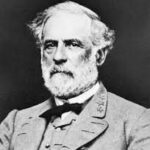I present here two readable accounts of Robert E. Lee, his tenure as president of Washington College, and his claims upon the modern imagination. The first was written by Washington & Lee journalism professor Toni Locy in a piece published in The Nation magazine, and the second by Al Eckes, W&L class of 1964, in an essay distributed by the General’s Redoubt, an ad hoc group of W&L grads formed to preserve Lee’s legacy at the university. The second essay includes a brief refutation of key points in Locy’s piece by Rex Wooldridge, secretary of the General’s Redoubt.
The essays are fascinating on two grounds: first for learning about a little-known phase of Lee’s life during a traumatic time of Virginia’s history, and second for the dueling interpretations of the man from a 21st century perspective. You will likely find much in both essays about the man and his times that you didn’t know before. I urge you to read them in tandem, and then decide for yourself whether Lee is worthy or not of being honored today.
— JAB


Leave a Reply
You must be logged in to post a comment.